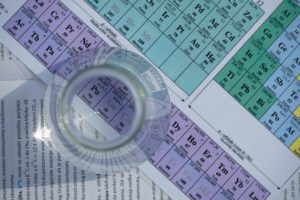Study Chemistry in Canada

Study Chemistry in Canada
Chemistry is a field of study that researches substances and explains how they interact with one another. Many international students decide to study Chemistry in Canada since the science degree may ensure job opportunities in the country. Chemistry graduates can work in various fields, including education, biotechnology, forensics, and government policy. Moreover, you should study Chemistry in Canada if you want to discover cures for incurable diseases, work on synthetic drug manufacturing, or test unregulated food production.
Overview of the Programs
If you are going to study Chemistry in Canada, you should start with obtaining a bachelor’s degree that lasts four years. It provides in-depth learning and hands-on lab work, preparing international students for chemical technician jobs in the fields of chemistry, agriculture, engineering, and health.
To deepen their knowledge of chemistry-based subjects, international students can apply for a master’s degree. To study Chemistry in Canada on the graduate level, they need to spend two years at the school. Then, international students will have the opportunity to choose a major on which they want to focus during their study. Additionally, most graduate degree programs in Chemistry require the submission of a thesis or research paper at the end of the study.
If you want to study Chemistry in Canada and obtain a doctorate degree, you should complete a Ph.D. program that lasts from three to five years. The program aims to develop the skills of international students for independent research and teaching. As a rule, students ought to take one or two courses per semester since they must dedicate most of their time to research and experiments in the Chemistry lab.
It is obvious that Chemistry is one of the more interesting STEM (Science, Technology, Engineering, and Mathematics) disciplines. To study Chemistry in Canada, you should choose the specialization to be focused on the kind of chemical science you want to work on later in your career. There are five main types of Chemistry specializations. The first specialization is Organic Chemistry. If you select this major, you study the carbon atom and how it interacts with other chemical substances. Moreover, when you study Chemistry in Canada, you will deepen your knowledge in chemistry concepts, such as covalent and ionic bonds, hydrogen bonds, protons, neutrons, electrons, molecules, oxidation and redox, synthesis and synthesis decomposition.
The next specialization is Inorganic Chemistry which focuses on the chemical structure and properties of things that do not include carbon. It deals with important inorganic compounds like water and metal.
Unlike Organic and Inorganic Chemistry, Analytical Chemistry studies complex things by separating them into smaller parts. If you want to study Chemistry in Canada and deal with chromatography, spectroscopy, titration, and precipitation reactions, you should choose a specialization in Analytical Chemistry. The next popular major is Physical Chemistry which studies what happens when elements come together and react to one another. If you want to know more about the combustion reaction and other fascinating chemical reactions, you should focus on this specialization.
If you wish to study Chemistry in Canada and study living things as a subgroup of carbon-based matter, you can choose Biochemistry. During the study, you will be focused on the smallest, most basic components of walking, talking, eating, breathing things around you. If you want to study Chemistry in Canada, you can also choose other specializations, including Geochemistry, Thermochemistry, Environmental Chemistry, Polymer Chemistry, Forensic Chemistry, Theoretical Chemistry, Industrial Chemistry, Nuclear Chemistry, Materials Chemistry, Medicinal or Pharmaceutical Chemistry.

Tuition Fees
Tuition fees for international students depend on the chosen school, study level, and specialization. If you want to study Chemistry in Canada and pursue an undergraduate degree, you should be ready to pay from 25,000 CAD to 51,000 CAD per year. The Bachelor of Science in Chemistry and Mathematics at the University of Victoria costs 25,860 CAD per year, the Bachelor of Science in Chemistry at Simon Fraser University costs 29,370 CAD per year, the Bachelor’s in Chemistry at the Western University costs 36,208 CAD per year, the Bachelor of Science in Biochemistry at McGill University costs 49,171 CAD per year, the Bachelor of Science in Engineering Chemistry at Queen’s University costs 50,926 CAD per year.
If you want to study Chemistry in Canada and earn a graduate degree, you should be ready to pay from 4,000 CAD to 12,000 CAD per year, the Master of Science in Biochemistry at the Western University costs 4,240 CAD per year, the Master’s in Chemical and Biological Engineering at the University of British Columbia costs 5,095 CAD per year, the Master’s in Chemical Engineering and Applied Chemistry at the University of Toronto costs 6,210 CAD per year. Master of Science in Chemistry at Dalhousie University costs 9,753 CAD per year, the Master in Instrumental Chemical Analysis at Trent University costs 11,700 CAD per year.
If you want to study Chemistry in Canada and obtain a postgraduate degree, you should be ready to pay from 9,000 CAD to 33,000 CAD per year, the Ph.D. in Chemistry at the University of British Columbia costs 9,131 CAD per year, the Ph.D. in Chemistry at the University of Montreal costs 14,696 CAD per year, the Ph.D. in Biochemistry (Chemical Biology) at McGill University costs 16,122 CAD per year. The Food Science and Agricultural Chemistry program at McGill University costs 20,972 CAD per year, the Ph.D. in Chemistry at McGill University costs 32,244 CAD per year.

Admission Requirements
If you are going to study Chemistry in Canada, you should be prepared for the selective admission process. Only international students who have the best academic record and high English language proficiency scores are admitted to the Canadian Chemistry schools.
To study Chemistry in Canada at the undergraduate level, you must provide a high school diploma, pass the English Language Proficiency Test, and have sufficient knowledge in two disciplines from Biology, Chemistry, Mathematics or Physics.
The basic admission requirements to study Chemistry in Canada at the graduate level for international students are the following:
- They need to have a bachelor’s degree in Chemistry or a related field from a recognized university.
- They ought to provide high GRE (Graduate Record Examinations) scores.
- International students must pass the English Language Proficiency Test, such as TOEFL, IELTS or MELAB.
- Depending on the school, they may need to submit the high school diploma, CV/Resume, and Statement of Purpose, describing the applicant’s goals, career expectations and reasons for studying Chemistry in Canada.
If you are going to study Chemistry in Canada and earn a Ph.D. degree, you must meet several basic requirements:
- International students must obtain a master’s degree in Chemistry with high standing from a recognized university.
- They must take the English Language Proficiency Test and demonstrate that their language knowledge of English is sufficient to pursue graduate studies in their chosen field.
- Depending on the Chemistry school, they may need to provide their thesis or research paper, three academic references, CV/Resume, and Statement of Purpose.
The mentioned admission requirements are typical for most Canadian schools. Nevertheless, you need to learn the specific requirements of the chosen educational institution if you want to study Chemistry in Canada.

Perspectives of the Future Employment
International students with a degree in Chemistry can work in both public and private sectors. Depending on their specialization, they can work for pharmaceutical companies, agrochemical plants, petrochemical firms, food processing companies, plastic manufacturing units, chemical manufacturers, military systems departments, space exploration agencies, education departments, or police departments.
When you finish studying Chemistry in Canada, you can expect to have a starting salary of 33,000 CAD per year. To be more specific, a laboratory technician earns 32,990 CAD per year, a research technician can earn 34,490 CAD per year, analytical chemist earns 37,581 CAD per year, a biochemist earns 55,680 CAD per year. Nevertheless, graduates who have a master’s or Ph.D. degree can get a job with a better salary package. For instance, a chemist can earn 84,670 per year CAD, a chemical process engineer can earn 95,500 CAD and more per year.
In case, if you need help with admission in order to study in Canada, please fill in application below or contact us directly.

